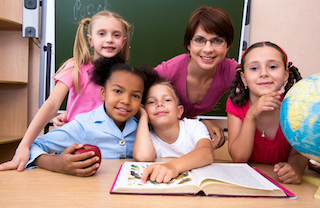 Evaluating the food choices made by their peers may improve the eating habits of young adolescents.
Evaluating the food choices made by their peers may improve the eating habits of young adolescents.
A study in the United Arab Emirates found that asking adolescents to consciously evaluate the food choices made by their peers caused them to choose healthier foods.
“The idea behind this result is that evaluating the choices of others forces young adolescents to think more deliberatively, which leads to less impulsive choices when it is their time to pick what to eat. Interestingly, this effect materialized irrespective of whether the peer’s choice was healthy or unhealthy,” Ernesto Reuben, lead researcher of the study and professor at the Center for Behavioral Institutional Design at New York University Abu Dhabi told Theravive.
“Our results suggest that, nowadays, early adolescents are knowledgeable about the healthiness of different foods and understand the value healthy eating. In other words, when they engage in unhealthy eating, it is not due to lack of information about which foods are healthy or the general benefits of eating healthy foods. Instead, they suggest that it is due to impulsive decision-making. Hence, interventions that naturally reduce impulsiveness and trigger more a deliberative thinking process have the potential to improve their food choices.”
In undertaking the research, Reuben and colleagues recruited 467 students in 5th and 6th grade in three international schools in Abu Dhabi in the United Arab Emirates.
In an experiment, the participants were presented with four trays of food each containing five different kinds of food of similar nutritional value. The participants were asked to select four items of food. Before they made their selection, the participants were told about the items of food an unknown peer had selected at a different school as part of the same experiment.
The participants were also asked how healthy they thought their unknown peer’s choice of food was, ranging from very unhealthy, unhealthy, healthy or very healthy.
Whether or not their remote peers’ food choice was healthy or unhealthy, being asked to evaluate how healthy it was caused the participants to choose significantly healthier food options.
“Since people model their peers, even if they are remote, societies with poor eating habits can fall into a negative self-perpetuating dynamic. This research reports a way to potentially counteract this adverse dynamic,” Reuben said.
“Our study suggests that incorporating evaluations of the healthiness of the food choices of others to generate greater awareness of one’s decision-making can be an important tool to fight unhealthy eating lifestyles. We show that the impact of interventions that give people information about what others do can be enhanced if deliberative thinking is triggered. And that interventions meant to trigger deliberative thinking appear to work well also among early adolescents.”
He says it is important the findings of the study be taken in context and not generalized.
“Understanding the context of the study is crucial when thinking about potential downsides in other contexts. In our study, the evaluation of peer choices was done in private and the peer whose choices were being evaluated was not actually present or known personally to the evaluator. I can easily imagine how in other social contexts, where peers can feel judged or marginalized if they are being evaluated, such a policy might have unintended consequences,” he told Theavive.
He is hopeful the findings of the study may play a role in developing strategies to curb childhood obesity.
“The fraction of children and adolescents classified as overweight and obese has risen dramatically from just 4% in 1975 to just over 18% in 2016. Hence, identifying effective public health strategies to address this problem is crucial to prevent obesity and other lifestyle diseases later in adulthood. In this respect, successful interventions during childhood have the potential to have large, long-run effects,” he said.
“From a public health perspective, having a better understanding of how young adolescents develop, evaluate, and subsequently make food choices can help us design efficient strategies to improve the eating habits of people while they are young. Early adolescence is an important age to influence food choice since it is the age at which obesity starts to have a strong negative impact on self-esteem and social relationships.”
Elizabeth Pratt is a medical journalist and producer. Her work has appeared on Healthline, The Huffington Post, Fox News, The Australian Broadcasting Corporation, The Sydney Morning Herald, News.com.au, Escape, The Cusp and Skyscanner. You can read more of her articles here. Or learn more about Elizabeth and contact her via her LinkedIn and Twitter profiles.